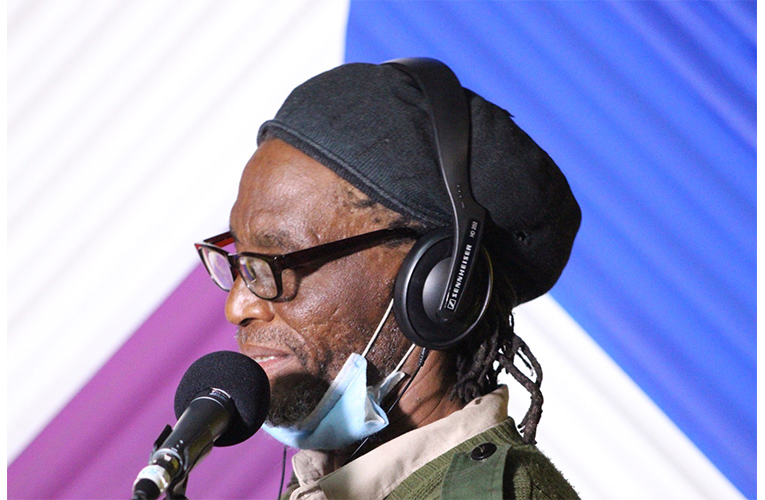Jazz trumpeter Mandla Mlangeni’s Black Consciousness Oratorio of a Forgotten Youth at Market Theatre
The performance of this classical musical art piece connecting 1976 and #FeesMustFall student protests is on January 28-29 featuring a choir, libretto by poet Lesego Rapolokeng and Yonela Mnana as musical director.
By Edward Tsumele, CITYLIFE/ARTS Editor
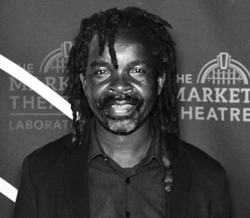
There are several things that separate jazz trumpeter Mandla Mlangeni from his peers. Even cutting through other generations of musicians in South Africa. The University of Cape Town educated musician is a man of action when it comes to taking control of his career. Not only the aesthetic part of it. Which every musician should, but also the business side of things.
There many initiatives that demonstrate the tenacity of the man when it comes to his career and creating opportunities for himself and the other musicians who work with hm. After all in show business money matters. But this is a side of the business that many a musician tends to ignore or delegate or surrender to other people. Not Mlangeni. The jazz artist keeps on experimenting musically while at the same time creating opportunities for himself and other artists.
For example in 2016, he ventured into something that expanded the scope of his artistry and demonstrated his intellectual and academic rigour and flexibility. That is when he conceived and executed the ideaof an on-going Black Consciousness grounded oratorio that fuses elements of jazz and opera as a medium of story-telling through performance art on a theatrical stage.

Going back into our history, and looking into what happened in 1976, with the now famous Student Uprising hogging international news headlines, this an on-going oratorio.It includes students from select universities in South Africa performing alongside established professional musicians in some instances. So farOratorio of a Forgotten Youthhas been critically acclaimed ever since it was first staged. Perhaps this should not be surprising.
That historically epochal event is when students in Soweto and elsewhere in the country took to the streets. Their grievance: the forced introduction of Afrikaans as alanguage of instruction in black schools. The students rebelled. Their protest gained momentum. It became a fully-blown political protestation. The protest went beyond the realm of normal student protest into an agitation for political change in general in the country.
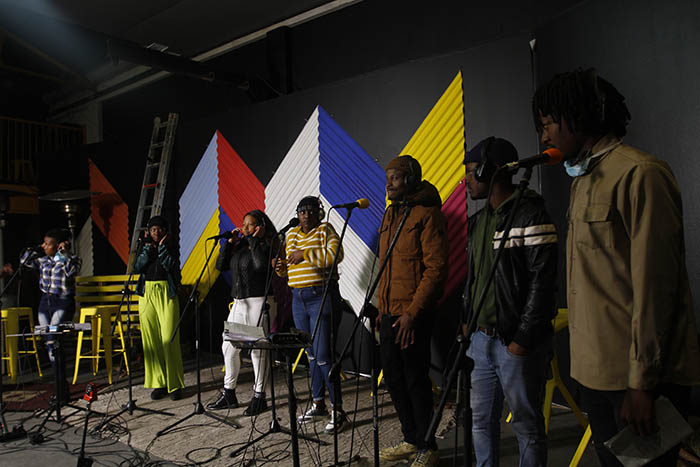
At the time the country was under the heavy yoke of apartheid. It saw black people playing second fiddle to white people in several areas of life. Politics. Social life. Education. Economy. These were denied to black people in the main. Those who were lucky or pushed their way into these important areas of life, found themselves on an unequal footing with their mainly white counterparts. Treatment was bad. Opportunities for advancement were non-existent.
Salaries were paltry. Option for education were limited to an inferior version reserved for blacks known as Bantu Education. However that protest is one single event that actually changed the direction of the struggle for freedom. Young people took a front seat in the struggle while adults somehow took a back seat for a while. While a major political event was taking place. But at the time, something was brewing behind the scenes.
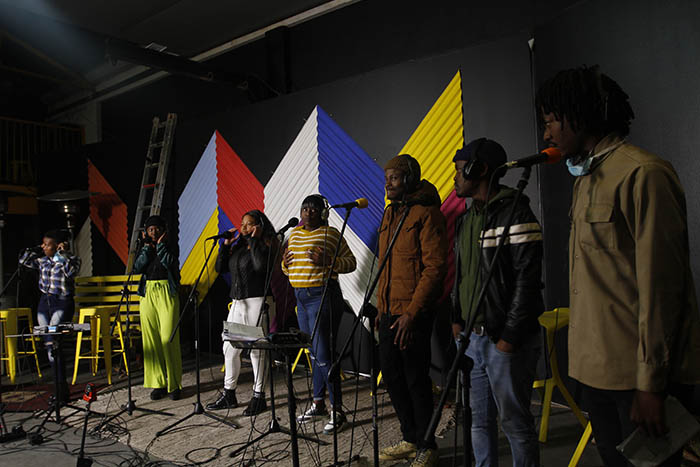
A philosophy that preached black pride and black self-determination was being championed by black intellectuals. The ideology of Black Consciousness was in full force. In fact somehow taking centre stage of black thinking in the then contested political context of the time among black freedom fighters and political strategists of the time. Such as the ANC whose leaders were in exile, the Pan Africanist Congress and the Black Consciousness Movement, to name but just a few.
Championed and promoted by a small number but influential section of the educated black elite of the time,the black intelligentsia it became a force to reckon with in rallying people around their quest for freedom from white oppression. There were a number of players behind the Black Consciousness Philosophy mobilisation, most prominent was the slain Steve Biko and his close knit group of black thinkers that included well-known names today such as Barney Pityana and Mamphela Ramphele. This philosophy had a huge impact on the student protest of 1976. In fact many an historian and political analyst cites this philosophy of Black Consciousness as the inspiration behind the student protest of 1976.
Fast forward this to the #FeesMustFall of 2015. This time University students took to the streets and protested against a university system and environment that continued to marginalise those students who came from poor and middle class black families among other issues. This category of students ironically in a post-Apartheid South Africa, whose ruling elite are former freedom fighters and mainly black liberators, found themselves struggling with a number of issues at university. The main issue being the high tuition fees their parents could not afford.
Though this was the most singular issue seizing those protests that almost matched the magnitude of the 1976 Student Uprising with regards to impact, it was not the only item of contention on the table. Others included the issue of decolonising the curriculum. The students protested that the curriculum at university remained Eurocentric and therefore out of touch with South Africa’s historical and cultural reality. They also charged that the university environment made black students feel marginalised and uncomfortable. Yet on almost all the campuses they form the majority of the student body.
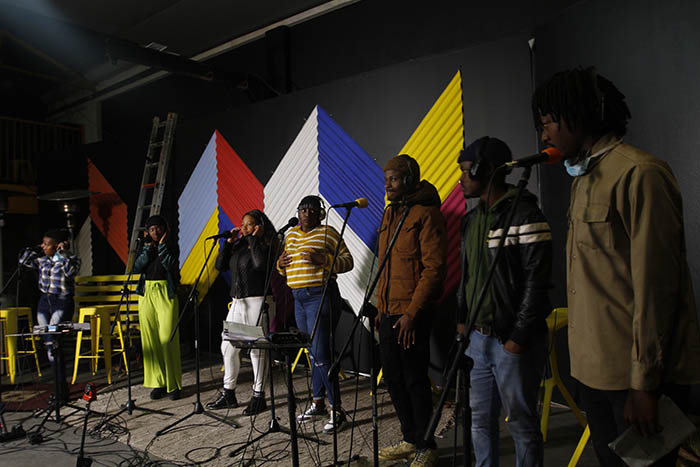
Many a political commentator, social analyst, writer and artist could not fail but notice the connection between the inspirationbehind this post-Apartheid student protest to the philosophy of Black Consciousness that underpinned the Student Protest of 1976. In a way and as a manner of speaking, this was history repeating itself. Question of different circumstances, different players, different political environment and leaders. Yet striking similarities.
This environment provided fertile ground for thespians, novelists and thinkers to prevail and through creating art of different genres, contextualise the #FeesMustFall protest through writing books, stage plays or composing music that spoke to the event. But doing so in a way that was able to connect the past with the current for the audience to make sense of what was going on.
One such artist who observed this connection is trumpeter Mlangeni. A man of action, he immediately responded to the events of 2015 by conceiving an oratorio. Oratorio of a Forgotten Youth was born. It is now maturing. It is entering its fourth iteration at the Market Theatre this mo0th. But to make sure that he created a piece of art that has integrity, intellectual rigour and appeals to diverse artistic tastes, Mlangeni roped in his mates in the artistic community.

Such as poets, fellow musicians and other thinkers. Basically this oratorio is an opera type of music adapted to jazz, complete with a choir, Vivacious Choir from the East Rand township of Katlehong, rhythm section, horn section and a trio of bass, piano and drum. The Amandla Freedom Ensemble completes Oratorio of a Forgotten Youth. The oratorio features the Resonance String Quartet, Vivacious Sounds Choir, and Amandla Freedom Ensemble.
The music composition in this oratorio is a collaborative effort by some of the most brilliant musicians in this country. Mlangeni himself and pianist and music scholar Yonela Mnana, who also plays the role of musical director. Music arrangement is by another talented pianist Afrika Mkhize.
The libretto is by fiery poet Lesgo Ramapolokeng, whose poetic repertoire ranges from rant, raving to soliloquy. He is the veteran of the stage, long having established himself as South Africa’s solo poetry voice internationally with his cutting edge poetry that dissects the country’s socio-political malaise during and post-Apartheid South. Brimming with talent like this, clearly this is a piece of performance art, I would advise one not to miss, irrespective of January being a tough month for many when it comes to financial issues.
“The first iteration was in 2016 and we performed it at Arts Cape. The production featured a Choir from the University of Stellenbosch, as well as poet Koleka Putuma and Thembi Mtshali-Jones among others. The oratorio really was inspired by #FeesMustFall, connecting that student protest to the student protest of 1976,” said Mlangeni in an interview ahead of the production’s performance at the Market Theatre on January 28 and January 29, 2023.

Mlangeni said as a country we risk forgetting the sacrifices that many people made, especially communities to liberate the country. “While it is not a bad thing point out the contribution of the Mandelas and the Sisulus in the fight for freedom for South Africa, it is incorrect to simply single out them alone, excluding many other families and communities’ contribution.
That way we risk suffering collective amnesia. The reality is communities contributed to the struggle. Be it under the banner of UDF (United Democratic Front) or as individuals who did not necessarily go to exile but fought the system within the borders of South Africa. For example my father Eric Mlangeni was part of the student protests in Soweto. He later on became a lawyer and continued to fight the apartheid system as a lawyer till they killed him in 1991 in Jabulani (Soweto) through a parcel bomb. The bomb was sent to him by Eugene de Kock (he confessed his deed at the Truth and reconciliation Commission according to Mlangeni).
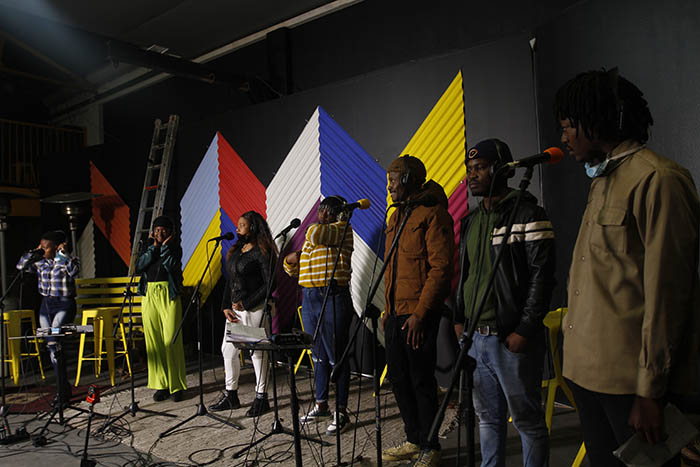
The irony is that people like Eugene de Kock is not only out of jail, but enjoying his government salary. Another example of those who perpetrated violence on people and continue to enjoy privileges include such people as Janusz Walus. He is paroled and yet he killed a leader of such stature as Chris Hani. And so this oratorio is to remind us of what happened in 1976 and how history repeated itself in 2015. But it is also to show how those who enjoyed privileges during apartheid continue to enjoy those privileges in a democracy, while those who suffered find themselves in a worse situation today,” Mlangeni reflected.
This is the 4th iteration of this critically acclaimed classical performance art piece. Also had successful seasons at the National Arts Festival in 2019. That memorable performance that saw Mlangeni rope in the Cape Town Philharmonic Orchestra formed part of Mlangeni’s major production as the 2019 Standard Bank Young Artist.
“The third iteration took place in 2021, and because it was during Covid-19 lockdown, we streamed the performance live online,” he explained.
A prolific musician, Mlangeni indeed is fond of collaborations in his art practice. For example in 2022, the award winning jazz trumpeter and composer’s Tune Recreation Committee (TRC) released their 3rd album titled The Future is Now . The album, co-produced by the formidable jazz pianist Mkhize represents a new direction for the sound of the ensemble, as they create a canvas on which musical ideas are expressed freely and honestly, whilst drawing inspiration from a myriad of influencers and showcasing the evolution of the member’s own compositional styles.
The TRC comprisedDamian Kaminethon drums, Nicholas Williams on bass, Reza Khota on guitar, and Mlangeni on trumpet. The album features a selection of special guests in the form of Mkhize on piano, SAMA award winning classical flautist Khanyi Mthethwa, multi -award winning multi-instrumentalist Mark Fransman, Yonela Mnana on vocals, the 2020 Standard Bank Young Artist for Jazz Sisonke Xonti on tenor and soprano saxophones, Gontse Makhene on percussion and a very special friend from Ethiopia based in the US, Haile Supreme on vocals.
This is clearly proof enough of Mlangeni’s collaborative spirit and those who have been observing his growth as a musician will not be surprised by is latest collaboration with other musicians in this latest iteration of Oratorio of a Forgotten Youth concert which comes complete with an album of the same name. Those who are part of Amandala Freedom ensemble are Mlangeni and Michael Nkuna on trumpet, Ofentse Sebula on tenor sax, Kgetsi Nkotsi and Junior Matsila on trombone, Mark Fransman piano and reeds, Dalisu Ndlazi on bass and Siphiwe Shiburi on drums
.Jazz trumpeter Mandala Mlangeni’s Oratorio of a Forgotten Youth will perform at the Market Theatre on January 28, 2023 at 7pm, where the album will be on sale, and 29 January at 3pm. Tickets for the Oratorio of a Forgotten Youth cost R150 and can be booked at Webticket.










